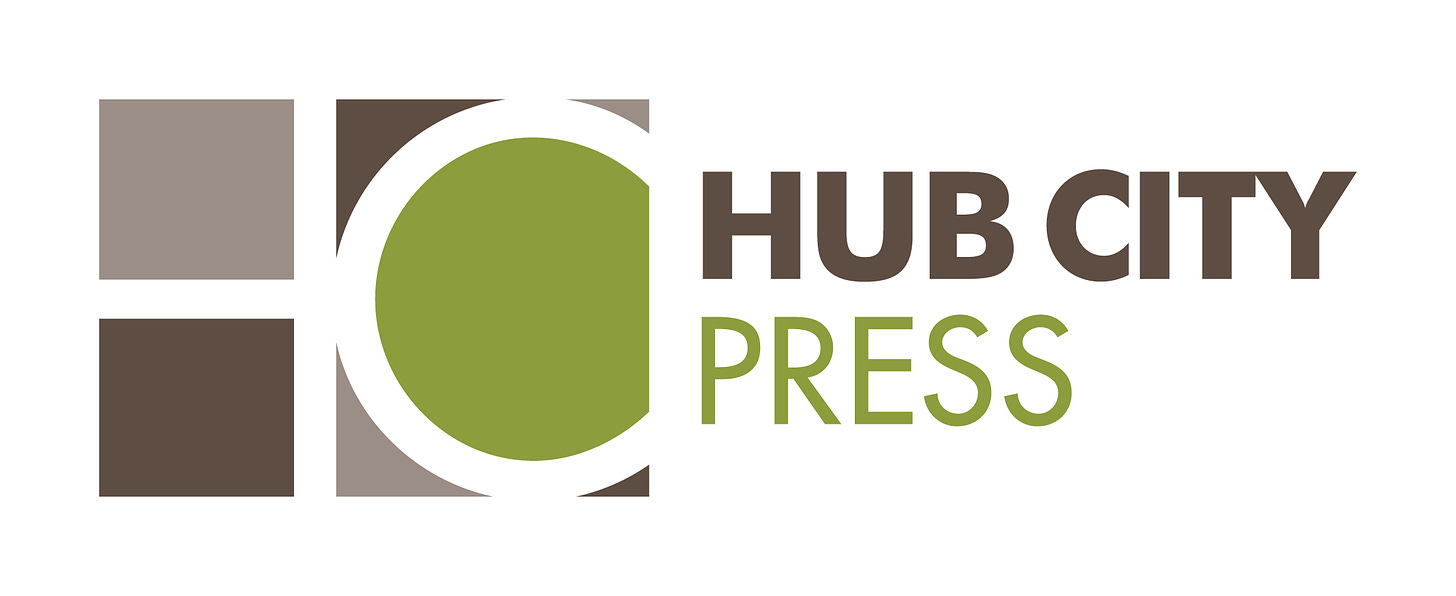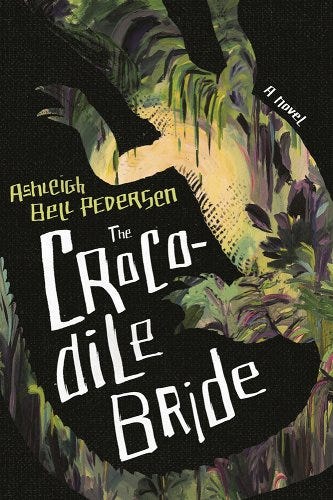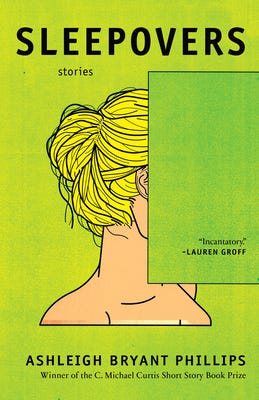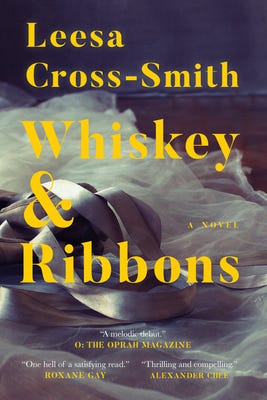At least once a month from now forward I’ll be bringing you a profile of an independent publisher, starting with Hub City Press of Spartanburg, SC.
Hub City is a great press putting out wonderful books on a small budget, punching well above their weight, including receiving a review from the New York Times just this week for Ashleigh Bell Pedersen’s newly released, The Crocodile Bride.
Meg Reid, director of Hub City Press answered my questionnaire.
Name/Location: Hub City Press, Spartanburg, SC
Year Founded: 1995
Number of Books Published Per Year: 7-10
First Book Published: 1995
Most Recent Book(s) Published: The Crocodile Bride by Ashleigh Bell Pedersen and Thresh & Hold by Marlanda Dekine
Biggest Seller: Recently, The Prettiest Star by Carter Sickels
Book You Published You Wish More People Knew About:
I think a lot of people know about Sleepovers by Ashleigh Bryant Phillips but it did come out at the height of the pandemic so I’ll continue spreading the word about how great it is. Ashleigh writes about the tiny rural North Carolina town where she was raised is a way that is unromanticized but also somehow deeply loving and tender.
If people pick up a Hub City book, what are they in for?
We publish approachable literary fiction. I think what we’re known for are multi-generational, multi-POV stories that illuminate lesser-seen parts of the South. Whether that’s Carter Sickels’s The Prettiest Star–a story of AIDS set in rural America–or Leesa Cross Smith’s Whiskey & Ribbons–a stunning first novel surrounding the death of a police officer–or even The Crocodile Bride by Ashleigh Bell Pedersen, which we’re publishing this spring, people really come to us for these kinds of stories. While the South is often stereotyped as a monolith, it’s actually the most diverse region in the US and home to the largest population of LGBTQIA+ people. Our list is an attempt to challenge the former assumption, by highlighting the latter.
What’s most challenging about being an independent publisher?
There are a lot of challenges! There’s very little money in it. The margins are getting smaller and smaller and making sure a book is visible at a national level takes a large investment of money on the part of the publisher. That might go to an outside publicist, paid marketing, sending authors to tradeshows, etc. These are the things the bigger outfits can afford easily because of the scale of their budgets.
Unlike many other presses, we have no big university budget or single corporate foundation funding us. We are very fortunate to be a nonprofit–it means we can apply for grants to pay for some of our operating costs–but in order to make the case that you deserve those funds, you must hew very tightly to your stated mission. That often means turning down a project that might make a lot of money but is off-mission or too commercial. And most of this work is invisible because the overall literary culture demands we never, ever speak about money. I suppose because we want to pretend books accomplish what they do in a vacuum.
In order to make up the difference in marketing budgets, independent presses have to rely on earned coverage like book reviews, which are running in fewer and fewer newspapers. This is especially true in the South, where newspapers are disappearing at an alarming rate. Indie titles are thrown into a giant hopper and have to compete with the thousands of titles released by the Big 5 each month. It can cause indie publishing workers to feel like they constantly could be doing more to support their books. This drive to do everything we can is definitely what sets indies apart from both Big 5 and the very tiny small presses but I worry it’s also leading to a lot of burnout.
When your list is as small as ours, it takes a long time to see growth. It takes a long time to build trust with the larger community of writers, communicating to them that you will treat their book with care and respect. It requires having a track record of success and intentionally picking titles that represent who you are as a press. By being clear with writers that they might make a little less money at the front end–with this model the writer and publisher share some of the financial burden--but the possibility is there to make a good amount in royalties in the long term. I find that once those writers understand the mission and the differences in the process, many of them become the strongest advocates for Hub City and for independent publishing overall.
What’s most exciting about being an independent publisher?
Being scrappy and getting national attention for our books will never lose its luster. I particularly love being mission-oriented–highlighting the work of southerners, of course, but also operating more transparently than larger outfits are able or willing to. Indie presses have always been far more committed to building a more inclusive list and to taking risks, whether that’s publishing writers from marginalized communities, hybrid genre works, books in translation, or books by writers without MFAs. When I look at our peer presses, I don’t feel frustrated or dismayed by the state of publishing. Independent and university presses are putting out inspired books and I think more and more writers are discovering them, refusing to let the corporate presses entirely define the market.
A lot of our focus is on providing a boutique author experience, which is our way of saying we really want to hold our author’s hands, especially for debuts, and guide them through the publication process. We work directly with our authors on their covers and on tour planning, and we try to be as transparent as possible. We don’t ever want anyone to feel lost or even sidelined by any part of the publication process. Our job is selling books, but it’s also shepherding someone’s art into the world.
Insert a question of your own you wish people asked about independent publishing, and answer it.
The question I get asked the most is probably “How do you get into indie publishing as a career?” I think it’s a good one because there is very little out there in the way of a guide. Publishing picks up people from across the humanities, from English, writing, sociology, history, etc. While there are programs that offer degrees and certifications in publishing, I have concerns that this simply isn’t a profitable enough career to ever offset the amount of student debt those programs require. Not to mention that they are often housed in universities in cities like NYC and Boston, which compounds that expense and makes them accessible only to those with family resources.
I chose to pursue an MFA at UNC Wilmington in order to access their Publishing Laboratory program, but took on debt to do so. I don’t think getting a MFA is the right solution for everyone. I’m increasingly a huge booster of programs like The Denver Publishing Institute, which offers a summer program covering every aspect of publishing that’s quite affordable. I have two former interns attending that program this summer. I’m glad more and more paid internships are popping up at indie presses nationwide.
This all goes back to my belief in the importance of decentralizing the publishing industry. I grew up far from any large publishing scene, first in Canada and then in rural Maine. But I did grow up in a town with an esteemed literary press (Alice James Books), so I was aware that there were small publishers making a national impact publishing poetry. Perhaps I wouldn’t have seen publishing as a career path without that influence.
Hub City Press is living proof that independent presses can exist and thrive outside of a few select urban centers, even--unbelievably!--in a small post-industrial city in the South. I believe that if we have publishers in cities across the country, we’ll have better, more inclusive lists that speak to the experiences of more folks. Plus, younger people will gain access to the industry and the terrific joys of making books.
Thanks to Meg, and if you have an independent press you’d like to see profiled, leave their name in the comments, or drop me an email.
John









Very interesting and enlightening. I may look for Crocodile Bride and add it to my list. Thanks very much.
thanks, this was really cool! indie presses that I would enjoy seeing profiled include Restless Books, Drawn & Quarterly, and (if possible since they publish your stuff too!) Belt Publishing